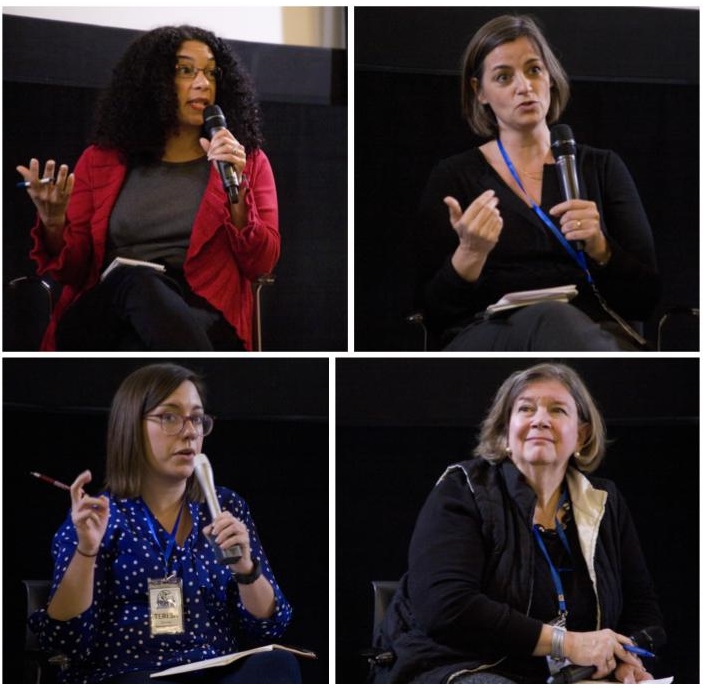Foundation reps outline vision for supporting local journalism organizations
For many local journalism publishers, foundation funding seems like the Holy Grail – if you can get it, it will

For many local journalism publishers, foundation funding seems like the Holy Grail – if you can get it, it will solve all of your revenue problems.
But is that true?
A panel at the 2017 LION Summit Friday morning made up of some of the “biggest supporters of local news” in the foundation world, according to LION Executive Director Matt DeRienzo, featured a frank discussion on what funders are looking for and how publishers can best approach them.
Jan Schaffer, an early supporter and advisor to LION and founder of J-Lab, led the panel entitled, “Foundation support for Local Journalism.”
Schaffer kicked off the discussion by noting that all of its members were women – something she said she thought was positive for the publishers in the room as “women pay a little more attention to journalism and community-building” as opposed to focusing on tech tools.
All of the funders on the panel have deep ties to journalism – something that made them especially interested in the work of LION members.
It is more difficult, however, for for-profit news organizations to get funded by foundations. Most of that funding, the panelists said, would likely come through member organizations such as LION, rather than directly to a for-profit news organization.
A great example of this kind of funding was announced during the LION conference, with the Democracy Fund’s $250,000 grant to LION Publishers to support an initiative to assist publishers of local independent online news organizations in developing sustainable business models.
The 18-month grant will assist LION in modeling business plans for advertising, native advertising and sponsored content, and email newsletters in support of local journalism at 10 independent online news organizations.
Teresa Gorman, the local news associate at the Democracy Fund, said during the panel discussion that the organization’s Public Square initiative is where they think about journalism. Its mantra, “putting people first in democracy,” is a good way to think about the Democracy Fund's approach to grant-making.
Gorman said that while its biggest news initiative so far has been investing with the Knight Foundation in the News Match program that gives nonprofit news organizations $28,000 in matching funds if they raise $28,000 by the end of the year, the Democracy Fund is also interested in supporting projects that involve tech and engagement tools and local news.
Karen Rundlet, program officer at the John S. and James L. Knight Foundation, said her organization’s funding focus has been on audience engagement and trust, talent and learning projects. She urged LION members to sign up for the Knight Foundation’s newsletter to receive information on open calls for proposals.
Knight started the News Match program last year and worked to expand it for 2017. News Match is the largest grassroots fundraising campaign to support nonprofit and investigative news organizations. The program is a $3 million collaboration between Democracy Fund, the Knight Foundation and the John D. and Catherine T. MacArthur Foundation to support nonprofit news organizations that play a vital role informing the public and holding those in power accountable.
Gorman, Rundlet and the News Integrity Initiative’s Managing Director, Molly de Aguiar all said it was easier for their organizations to fund projects rather than general operations, and that they were more likely to fund projects that sustained an organization’s work.
De Aguiar said she was proud that during her time at the Geraldine R. Dodge Foundation, it funded organizations with general operating support.
All panelists said the key to getting funded was to build relationships with funders.
“Build a relationship and get to know us. If we know what you are working on… we can be a connector,” de Aguiar said.
Speaking at journalism events, serving on panels and writing about your work are other ways to communicate about what you are doing at get noticed by funders, the panelists said.
It also is important to check out funders’ websites and make sure your proposals align with their strategy and goals, before you reach out to make your pitch. Your proposals need to fit in with their goals.
Other tips offered in the session include being clear about your mission and the goal of the project you are proposing, make sure it is feasible to accomplish, and if you are turned down by a foundation, it is OK to keep asking, but do not be overly persistent or that will turn the funder off.
Learn more about the projects funded by the panelists’ foundations and how to apply:
https://www.journalism.cuny.edu/centers/news-integrity-initiative/
https://knightfoundation.org/programs/journalism
http://www.democracyfund.org/priorities
Maria Archangelo is publisher of Philadelphia Public School Notebook, a nonprofit news organization that covers issues related to public education in Philadelphia.
Sign up for the weekly newsletter
Join the LION mailing list to get our weekly roundup of opportunities and resources for news entrepreneurs. View our most recent issues.
Related Articles
Last call: Apply to receive $600 in travel support to attend the Independent News Sustainability Summit in Chicago
Fill out the travel stipend request form by Sunday, July 21, at midnight ET.
Igniting innovation: How RJI empowers independent news publishers to experiment with new ideas
RJI supports small newsrooms and community-centered journalists as they work to serve their communities.
How The Bedford Citizen prioritized its internal operations to pursue revenue growth and avoid burnout
Through LION’s Sustainability Lab, the team developed a master spreadsheet to track ideas and impact.